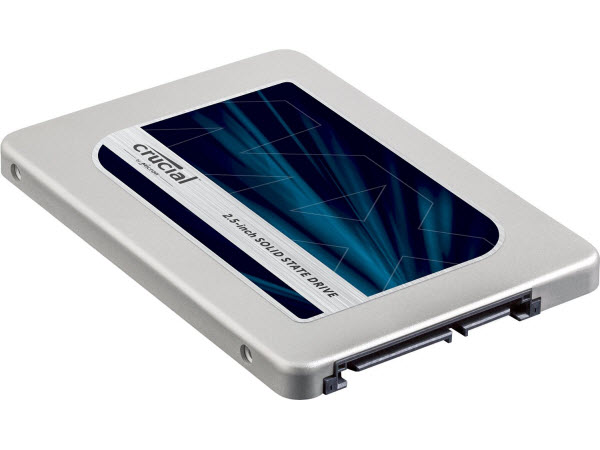Crucial MX300 750GB SSD Review
Micron's new 3D flash comes to market first in a limited edition MX300 750GB SSD. The new drive joins Samsung's 3D with TLC in the mainstream category.
Why you can trust Tom's Hardware
Conclusion
Micron has a number of new SSDs coming to market through its various brands. The drives span the entire range of usages, from high-performance NVMe datacenter products down to the MX300 targeting mainstream customers.

We have to wonder if this broad approach is taking away from Crucial's commitment to quality, and if performance issues are falling through the cracks as a result. The MX300 750GB Special Edition already received one firmware tune-up due to problematic performance from the first batch of samples. But its benchmark numbers are still sub-par compared to other 512GB- and 1TB-class drives.
Crucial tries increasing value by leveraging high-density NAND, giving you more capacity in comparison to mainstream 512GB SSDs. However, some low-cost 1TB products already ship in this price range as well. You'll have to decide whether a performance trade-off for more capacity makes sense.
The last major SSD released with 750GB of capacity was Samsung's 840 EVO in 2013. We chose 1TB-class SSDs to compare against Crucial's MX300 because the company plans to sell this drive for $200, which is the starting price for many value-oriented 1TB models. Crucial says the MX300 is a mainstream SSD, but its performance puts it up against drives like Adata's SP550, Corsair's Force LE and OCZ's Trion 150. All three also sell for $200.
We do appreciate some of Crucial's software features, which we rarely see accompanying entry-level SSDs. The drive utilizes 256-bit AES hardware encryption for Wave and eDrive support. Crucial's Storage Executive features Momentum Cache, a DRAM cache algorithm that increases the performance and endurance of Crucial SSDs, as well as other useful features. The MX300 also has an endurance advantage over many of its low-cost competitors.
I think we can put the performance issues on the back of Marvell. We have four other Dean-based SSDs in the lab, and only one delivers true mainstream benchmark results. The others target entry-level buyers. The four-channel Dean controller is late to market, and in our opinion it's not the right processor to take on the four-channel Silicon Motion or eight-channel Phison controllers dominating the mainstream space (behind Samsung's 850 EVO).
Crucial has a long history of partnering with Marvell, but that might have been the wrong move here. Its BX100 and BX200 both utilized SMI controllers, and Crucial may have realized better performance with a SM2258.
MORE: Best SSDs MORE:
All Storage Content
Subscribe to us on Facebook, Google+, RSS, Twitter & YouTube.
Stay On the Cutting Edge: Get the Tom's Hardware Newsletter
Get Tom's Hardware's best news and in-depth reviews, straight to your inbox.
-
bit_user I've always done well with Crucial. Price per GB is competitive, even if their performance was middle of the pack.Reply
More importantly, the end-to-end error-correction offered in their MX100 and MX200 were key, for me. I don't even mind sacrificing a bit of performance, for it. I wonder if the MX300 has it? -
mapesdhs Typo in the first page, "... enthusiasts should expect more options in the 2GB+ range." - I'm assuming that should be 2TB.Reply
Pity about the performance, I had high hopes until I started seeing the results. OTOH, some do care more about capacity and price, so it may be that Samsung and others have to lower the prices anyway if Crucial can pinch some customers away.
One thing, does Crucial's modern SSD management tool allow one to do a secure erase without having to use a 3rd-party program or reboot the system? That wasn't the case with older models and was a big no thanks for me; always liked the way OCZ's tool could do a SE on the fly, and now Samsung's Magician can do that aswell (can't remember if SanDisk can).
I look forward to the death of 64GB/128GB models, they're holding things back. It'd be good if 256GB could die by the end of this year aswell, but I doubt that'll happen. -
uglyduckling81 Most people wouldn't know or care about the difference between a Sammy Evo drive and this. All they will see is the capacity and the price. Make it cheaper and they will come.Reply -
mdd1963 Any new rigs would seem incomplete without an M.2/NVMe capability, and, specifically, ...a Samsung 950 Pro and it's 2000+ MB/sec! (The rest of the SATA old school SSDs can battle over 500 vs 510 vs 550 Mb/sec, etc..)Reply -
CaedenV Reply18119633 said:Any new rigs would seem incomplete without an M.2/NVMe capability, and, specifically, ...a Samsung 950 Pro and it's 2000+ MB/sec! (The rest of the SATA old school SSDs can battle over 500 vs 510 vs 550 Mb/sec, etc..)
Perhaps for you and I, but someone like my dad would love this kind of drive. Much more space than older SSDs, while still providing much faster performance than a traditional HDD, all while keeping the price down. There may be other SSDs on the market that provide a little cheaper $/GB, but I would bet that this drive will drop in price with time to reflect how it performs compared to others. -
Sakkura This SSD should either have been that bit cheaper to really compete with the planar TLC drives, or faster to move into the 850 Evo performance tier. I'm a bit disappointed that it doesn't have that kind of performance, but more disappointed still that it's not even priced properly for its performance level.Reply
Price drops in retail can always fix that, admittedly, but there's really not much to get excited about here. I don't understand why Micron thought this was the way to introduce their shiny new 3D NAND. -
cknobman Not cheaper.Reply
Slower.
Uses more power.
No improvement on endurance.
Am I missing anything major here?
I just dont see anything that is purchase worthy here.
